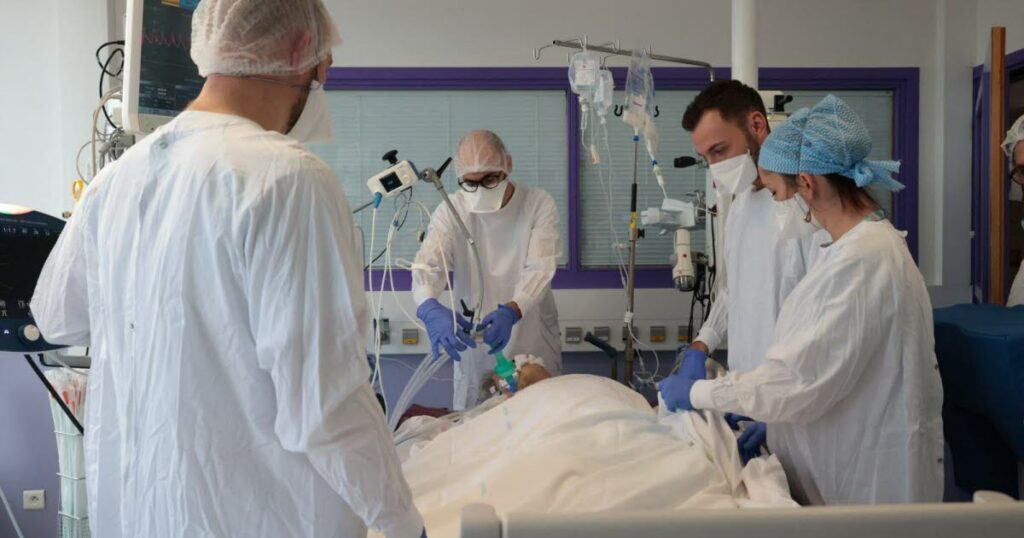Scientific discoveries about Covid-19, which appeared just over two years ago, are still multiplying.
“An increased risk of hospitalization and mortality”
Latest: according to a pre-published study by researchers at the University of Hong Kong, a Covid-19 infection “significantly” increases the risk of contracting other serious diseases afterwards: pulmonary, cardiovascular, neurological, muscular conditions , digestive and even certain cancers.
Worse: according to this study, even a mild infection leads to an increased risk of serious illness and premature death.
There is an increased risk of hospitalization and mortality [précoce] due to a wide variety of pulmonary and extrapulmonary diseases after Covid-19, especially for serious infections. Mild disease was also associated with increased all-cause mortality
The authors of the study
The study was posted online on March 23 by researchers at the University of Hong Kong. They relied on a titanic amount of health data: that of 412,000 British patients, from the huge UK Biobank database, which brings together medical information from more than 500,000 people.
Severely affected patients at high risk
All patients included in the study were hospitalized at least once between January 31, 2020 – the date of the first case detected in the UK – and September 30, 2021 (October for deaths).
The scientists then measured the risk of being hospitalized or dying (whatever the cause) between 25,460 patients infected with Covid and the others. The biases induced by risk factors other than Covid, starting with the age of the patients, have been taken into account and corrected.
135 disease categories
The results are clear: infection with Covid-19 alone, especially in the event of a severe form, “significantly” increases the risk of being hospitalized or even dying prematurely from a large number of pathologies: no less than 135 categories of diseases were taken into account.
In detail, patients who suffered from a severe form of Covid-19 (those who were hospitalized for this reason) were up to 12 times more often hospitalized, then, for other respiratory diseases, such as pneumothorax. .
The risk of stroke multiplied by five
The risk of myocardial infarction appears to be doubled. And it is four times higher for cerebrovascular accidents (CVA), five times for kidney dysfunction, and still nearly four times for Parkinson’s disease. The risk is multiplied by nearly 10 for brain damage as a whole.
Even the risk of fracture – which can be explained by the great fatigue often following Covid-19 – is multiplied by three to four.
Covid-19, in its most severe forms, is also associated with a high risk of secondary infections: four times more bacterial infections in former hospitalized patients. But also… of cancers: researchers have identified up to three times more cases of stomach tumors, and five times more cases of brain tumors.
Sometimes an indirect effect of Covid-19
According to the authors, it is not always Covid-19 which directly leads to the increase in these risks, but the general deterioration in the state of health of patients, whose immune system is seriously affected. Certain bacterial infections are in fact likely to favor the appearance or development of tumoral lesions.
Logically, mortality is also much higher: patients treated in hospital for Covid-19 show a mortality 14 times higher, all causes combined.
Patients who have suffered from a so-called mild form of Covid-19 are not spared: to a lesser extent, they also suffer more often than others from various pathologies, even several months after infection.
This is particularly true for certain conditions: muscle pain or lung problems such as inhalation pneumopathy (inflammation of the lungs due to the passage of gastric contents into the respiratory tract).
A 20% increased risk of mortality for mild forms
Even these patients show an increased risk of premature mortality from all causes: 20% on average, but up to nine times higher in the case of a neurocognitive condition:
Given the very high number of people infected with the coronavirus, even a modest increase in mortality risk implies a large number of additional deaths. This suggests that containing infections is still important, as are efforts to decrease the number of severe cases.
The authors of the study
This increased risk remains measurable at least for several months after infection with Covid-19. In most cases, excess hospitalizations and deaths occurred within three months of contamination.
But even after six months, the increased risk remains high, in particular for certain diseases: inhalation pneumopathies, renal dysfunctions, injuries and fractures, bacterial infections.
Another study, involving hundreds of patients affected by “long covid”, was published in early April. She revealed another worrying figure: one patient in five suffers from heart failure six months after infection. Half of them are still suffering from it twelve months later.
From a public health point of view, we need to consider the full burden caused by Covid-19 in order to determine the measures to be taken (such as the lifting of restrictions), including complications caused by Covid as well as disabilities. and mortality due to these complications
The authors of the Hong Kong study
The lifting of the restrictions in question?
Most European countries have, like France, lifted most health measures in recent weeks despite a strong rebound in the epidemic. Many of them have, however, reinstated the compulsory wearing of masks indoors, in order to limit the rise in contamination.
In the United Kingdom, which has lifted almost all of its health restrictions for several months, hospital admissions are soaring and the number of contaminations continues to explode, as the British Medical Journal recalls, deploring the risk of a lack of oxygen.
Germany voted against compulsory vaccination of people over 60 on Thursday. But the Minister of Health, pointing to the risk of long covid, warns:
Today, everyone should try to avoid contamination. Even if the symptoms are mild at the time, there is a risk that life will change. Nobody likes to hear it, but that’s the way it is
Karl Lauterbach, German Minister of Health

